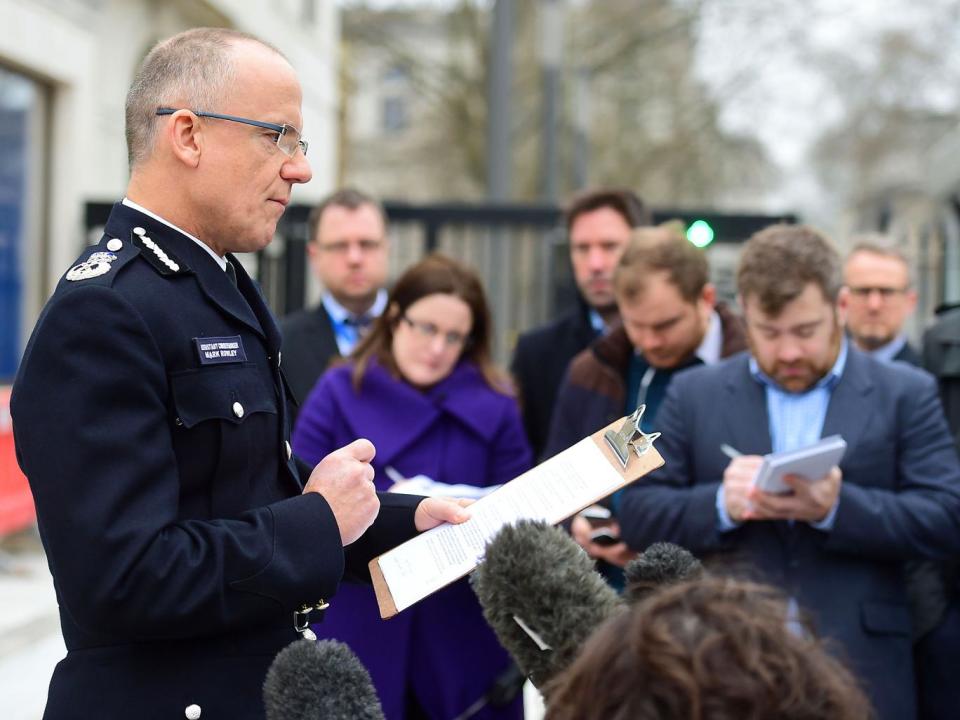Khalid Masood: Met Police says attacker's previous name was Adrian Russell Ajao amid confusion over aliases
The Westminster attacker was born as Adrian Russell Ajao in Kent, police investigating the atrocity have said as confusion remains over Khalid Masood’s numerous aliases.
Scotland Yard's Deputy Commissioner, Mark Rowley, identified the suspected Isis supporter only as Adrian Russell in a press conference but the Metropolitan Police later gave his surname as Ajao.
His birth name was originally reported as Adrian Elms, with his mother named as Janet Elms. The Daily Mail reported that she married a man named Phillip Ajao in West Sussex when Masood was a small child.
It remains unclear precisely when Masood’s various surnames were changed and he also went under aliases including Khalid Choudry. The Home Office is understood to be investigating the issue.
Deputy Commissioner Rowley said officers were investigating whether Masood was radicalised by online jihadi propaganda or if he may have been directed by terrorists.
“Our investigation focuses on understanding his motivation, his preparation and his associates,” he added.
“Our determination is to find out whether he acted totally alone inspired by terrorist propaganda or if other have encouraged, supported or directed him.”
Isis hailed Masood as a “soldier of the Islamic State” in a claim of responsibility issued the following day, although the extent of any involvement by the terrorist group remains unclear.
Analysts told The Independent the claim’s lack of biographical information and specifics suggested Isis did not directly commission or facilitate the attack outside the Houses of Parliament.
Isis has claimed responsibility for a series of potential “lone wolf” attacks as it seeks to distract attention from its huge territorial losses in Syria and Iraq.
Jean-Marc Rickli, a research fellow at King’s College London and the Geneva Centre for Security Policy, said the group’s members could have been in contact with Masood online.
“When Isis has not directly ordered an attack, it does some kind of vetting process and background check to see if the person has been in contact with Isis members in one way or another,” he told The Independent.
“The concept of ‘lone wolf’ is difficult because in most cases there is contact with recruiters, or people involved in the organisations can be traced.
“Pure lone wolf attacks are very rare, they are more the exception than the norm.”
Renad Mansour, an academy fellow in the Middle East and North Africa Programme at Chatham House, also said the idea of “lone wolf” attacks was problematic.
He said that while many assailants act on their “own intuition” and with no direction, they are frequently part of wider online or offline extremist networks incorporating family members or friends.
“Isis is far from being a centralised organisation,” Dr Mansour told The Independent. “Sometimes you have people in these networks going to Syria and then coming back but it’s hard to draw a direct link.”
Detectives are "looking at his history" amid reports Masood may have travelled overseas.
Two more “significant” arrests were made in the West Midlands and North West overnight, with nine people currently in custody in relation to the attack, with five searches ongoing and 16 completed.
One woman has been released on bail as detectives sift through 2,700 seized items and masses of computer data, as well as interviews with 3,500 witnesses and video footage taken by members of the public.
Deputy Commissioner Rowley said hundreds of officers were involved in the counter-terror probe codenamed Operation Pacific across the UK.
He appealed to the public for information on Masood, particularly from anyone who could provide information on his associates and recent travel.
“There might be people out there who did have concerns about Masood but didn’t feel comfortable, for whatever reason, passing that information to us,” he added.
His attack left four victims dead and 50 others injured of 12 different nationalities, with 31 requiring hospital treatment.

Deputy Commissioner Mark Rowley named a fourth victim who died on Thursday night as Leslie Rhodes, from Streatham in South London.
The 75-year-old was undergoing treatment in hospital before life support was turned off.
Mr Rhodes was the third victim to die from injuries sustained as Masood ploughed his car into pedestrians on Westminster Bridge, killing mother-of-two Aysha Frade and American tourist Kurt Cochran, who was in London with his wife to celebrate their 25th anniversary.
Masood then ploughed the vehicle into a fence outside the Houses of Parliament before running to an entrance and fatally stabbing PC Keith Palmer, before he was shot dead.
Theresa May told MPs packed into the House of Commons that he had been the subject of a historical MI5 investigation over suspected violent extremism but was not charged with terror offences.
Masood had also been jailed repeatedly for violent crime dating back to the 1980s, including grievous bodily harm, possession of offensive weapons and assault.
A minute’s silence was held for his victims as faith leaders, the Home Secretary and Mayor of London joined thousands of Londoners at a memorial held in Trafalgar Square on Thursday evening.
More candlelit vigils for the victims are scheduled on Friday in Birmingham, where Masood recently lived and hired the car used for the massacre, and London.

 Yahoo News
Yahoo News 